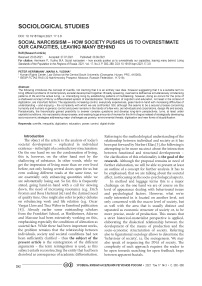Social narcissism - how society pushes us to overestimate our capacities, leaving many behind
Автор: Herrmann Peter, Yudina Maria A.
Журнал: Уровень жизни населения регионов России @vcugjournal
Рубрика: Социологические исследования
Статья в выпуске: 3 т.17, 2021 года.
Бесплатный доступ
The following introduces the concept of overlife, not claiming that it is an entirely new idea, however suggesting that it is a suitable term to bring different problems of contemporary societal development together. Broadly speaking, overload is defined as simultaneously condensing patterns of life and the actual living, i.e. intensifying living by establishing patterns of multitasking; however, doing so occurs for the price of a shallowed concept of life by a differentiated system of standardization. Simplification of cognition and education, not least in the context of digitization, are important factors: The apparently increasing control, everybody experiences, goes hand-in-hand with increasing difficulties of understanding - and enjoying - the complexity with which we are confronted. Still, although this seems to be a secular process concerning humanity and humans in general, control and power remains in the hands of a few who, as individuals and corporations, design life and society. Paradoxically, the theoretically gained possibility to answer complex questions and develop long-term perspectives, turns, at least under capitalist conditions, into narcissistic idiosyncrasies, and wasting huge amounts of monies for the thrill of egos instead of strategically developing socio-economic strategies addressing major challenges as poverty, environmental threats, digitisation and new forms of stupidification
Overlife, inequality, digitization, education, power, control, digital divide
Короткий адрес: https://sciup.org/143178401
IDR: 143178401 | DOI: 10.19181/lsprr.2021.17.3.8
Список литературы Social narcissism - how society pushes us to overestimate our capacities, leaving many behind
- Cascio W.F., Montealegre R. How Technology Is Changing Work and Organizations. Annual Review of Organizational Psychology and Organizational Behavior. Vol. 3 No.1. P. 349-375. DOI: 10.1146/annurev-orgpsych-041015-062352.
- Dobrinskaya D.E., Martynenko T.S. Perspectives of the Russian information society: Digital divide levels. RUDN Journal of Sociology. P.108-120. DOI: 10.22363/2313-2272-2019-19-1-108-120 (in Russ.).
- Elias N. The Society of Individuals. Dublin: UCD Press, 10 December 2010 [Collected Works. vol. 10]). xvi + 224 pp. ISBN: 978-1-906359-07-2.
- Eurofound. Regulations to address work-life balance in digital flexible working arrangements. New forms of employment series. Publications Office of the European Union. Luxembourg. 2020. DOI: 10.2806/03528.
- Falikman M. There and Back Again: A (Reversed) Vygotskian Perspective on Digital Socialization. Front. Psychol. Vol.12. Feb. 2021. DOI: 10.3389/fpsyg.2021.501233.
- Fromm E., Hartmut R. Resonanz. Eine Soziologie der Weltbeziehung. Frankfurt/M.: Suhrkamp. 2015.
- Gladkova A., Ragnedda M. Exploring digital inequalities in Russia: an interregional comparative analysis. Online Information Review. 2020. Vol. 44 No. 4, pp. 767-786. DOI: 10.1108/OIR-04-2019-0121.
- Glazev S.Y. Noonomy as the kernel for the formation of new technological and world economic modes. The Economic Revival of Russia. No. 2(64). P.15-32 DOI: 10.37930/1990-9780-2020-2-64-15-32 (in Russ.).
- Graeber D. Bullshit Jobs. A Theory. New York et altera: Simon & Schuster. 2018. DOI: 10.37074/jalt.2018.1.2.17.
- Kozlova O.D., Kinderknekht A.S. The Phenomenon of Clip Thinking: Between Stereotype and Rhizome. Voprosy Filisofii. 2018. Vol. 26. No. 2. P. 39-45. (in Russ.).
- Luhmann N. Politische Planung. Aufsätze zur Soziologie von Politik und Verwaltung. Opladen. 1971. 35 p.
- Maceviciute E., Wilson T.D. Digital means for reducing digital inequality: Literature review. Informing Science: the International Journal of an Emerging Transdiscipline. 2018. No. 21. P. 269-287. DOI: 10.28945/4117.
- Mayer-Schönberger V., Ramge Th. Reinventing Capitalism in the Age of Big Data. London: John Murray, 2018.
- McDonald A.M., Cranor L.F. The Cost of Reading Privacy Policies. 1/S: A Journal of Law and Policy for the Information Society. 2008. Vol. 4. No. 3. P. 543-568.
- Pistor K. The Code of Capital. How the Law creates Wealth and Inequality. New Jersey/Oxfordshire: Princeton University Press. 2019.
- Preskill J. Quantum Computing in the NISQ era and beyond. Quantum. 2018. Vol. 2. P. 79. DOI: 10.22331/q-2018-08-06-79.
- Ragnedda M. The Third Digital Divide: A Weberian Approach to Digital Inequalities. London: Routledge. 2017.
- Selwyn B. Poverty chains and global capitalism. Competition & Change. 2019. Vol.23. No.1. P.71-97. DOI: 10.1177/1024529418809067.
- The Digital Divide The Internet and Social Inequality in International Perspective. Edited by M.Ragnedda, G.W. Muschert.. Routledge. 2013.


